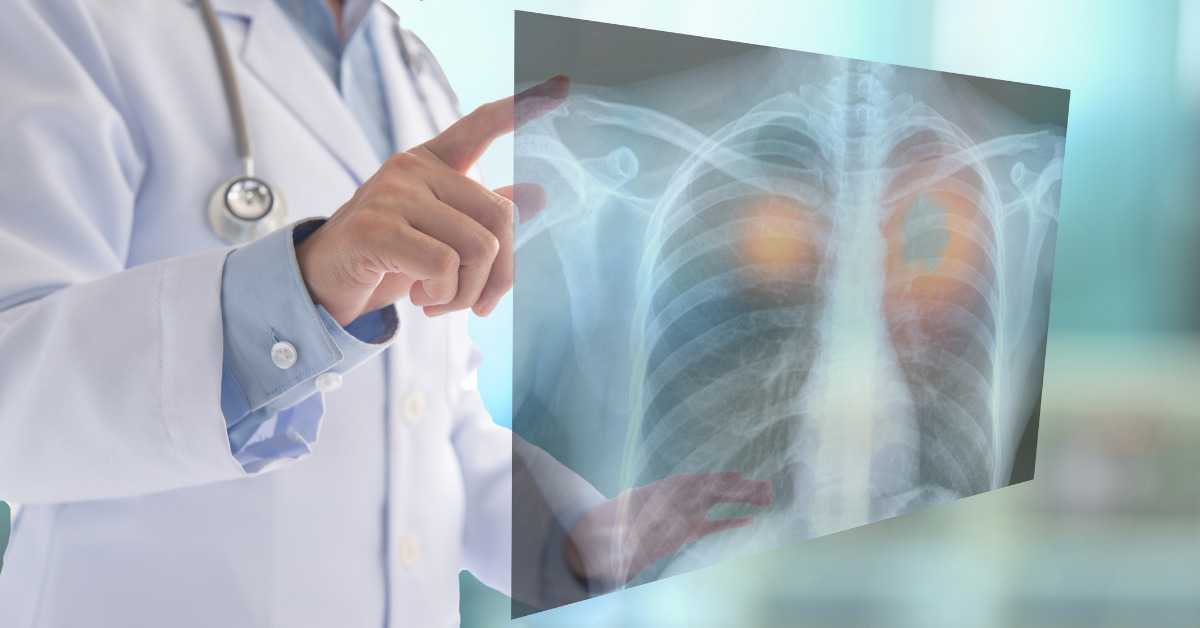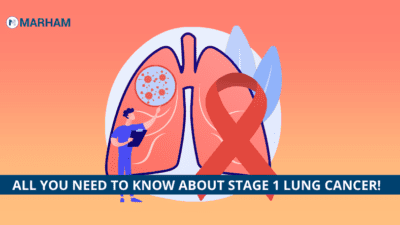Did you know that lung cancer is one of the leading causes of cancer deaths around the world? In fact, it causes more deaths than breast, prostate, and colon cancers combined.
While any type of cancer can be deadly, lung cancer is especially dangerous because often there are no symptoms until the disease is in its later stages. This health blog will discuss Stage 1 Lung Cancer Symptoms, Treatment, and Prevention.
What is Lung Cancer?
Cancer that begins in the lungs, is known as primary lung cancer. The lungs are two spongy organs in your chest that take in oxygen and release carbon dioxide. Cancer is the growth of abnormal cells in the body.
These cells can grow into (invade) nearby tissues and spread to other parts of the body. Lung cancer can be divided into two major types: non-small cell and small cell.
Early detection is key to successful cancer treatment and outcome. Click here to book an online appointment with the Best Cancer Specialists in your city via the Marham app!
What are Stage 1 Lung Cancer Symptoms?
Most people with early-stage lung cancer will not have any symptoms. This is one of the reasons why lung cancer is so difficult to detect early.
When symptoms do occur, they may be nonspecific and could be attributed to other conditions. This is why it’s important to see your doctor if you’re experiencing any new or unusual symptoms that are persistent.
Some common symptoms of lung cancer include:
- A new cough that doesn’t go away
- Chest pain that is worse with deep breathing, coughing, or laughing
- Hoarseness
- Shortness of breath
- Wheezing
- Coughing up blood
- Fatigue
- Loss of appetite or weight loss without trying
- Swelling of the neck or face.
If you’re experiencing any of these symptoms, it is essential to see your doctor for an evaluation. While these symptoms can be caused by other conditions, it’s important to rule out lung cancer.


Also, read the 5 Effects of Second-hand Smoke on Lungs
What are the Causes of Lung Cancer?
Lung cancer is the second most common cancer in both men and women and is the leading cause of cancer death in the United States.
“Cigarette smoking is the number one cause of lung cancer.” –CDC
Other causes of lung cancer include:
- exposure to secondhand smoke
- radon gas exposure
- asbestos exposure
- air pollution
Lung cancer can be prevented by quitting smoking and avoiding secondhand smoke and exposure to other known carcinogens.
Also, see Foods that Keep Your Lungs Healthy
Risk Factors for Lung Cancer:
There are several risk factors that increase a person’s chance of developing the disease. These include:
- smoking
- family history of lung cancer
- exposure to secondhand smoke
- exposure to certain chemicals and pollutants
- a history of lung diseases, such as tuberculosis or COPD
- a weakened immune system
If you have any of these risk factors, it’s important to get screened for lung cancer.
What is the Treatment of Stage 1 Lung Cancer?
The most common treatment for stage I lung cancer is surgery to remove the tumor. Other treatments may be recommended in some cases, such as radiation therapy or chemotherapy.
The type of treatment that is best for you will depend on several factors, including the size and location of the tumor, your overall health, and your preferences.
Some common treatment options are:
- surgery
- radiation therapy
- chemotherapy
Most people with stage I lung cancer can be cured. The chance of cure depends on many factors, including the type of lung cancer, the size of the tumor, and other factors.
The Bottom Line
Lung cancer that is caught in the early stages has a much higher survival rate than lung cancer that is diagnosed in the late stages.
If you’re a smoker or have any of the stage 1 lung cancer symptoms, it’s especially important to be vigilant about any new or unusual symptoms and to see your doctor for regular screenings.
Can’t Find the App?
| Android | IOS |
|---|---|
  |
  |
FAQs
Can lung cancer be cured at stage 1?
Lung cancer can be cured at stage one. However, the chance of a cure decreases as cancer progresses to later stages. That’s why it’s so important to catch lung cancer early when it’s most treatable.
What does early-stage lung cancer feel like?
The symptoms of early-stage lung cancer are often vague and nonspecific, which can make them easy to overlook. Common symptoms of early-stage lung cancer include a cough that doesn’t go away or gets worse, shortness of breath, and chest pain.
How quickly does stage 1 lung cancer spread?
Stage one lung cancer is considered to be localized, which means it hasn’t spread outside of the lungs. However, it can still spread to other parts of the lungs. The sooner you catch lung cancer, the better your chances are of beating it.

